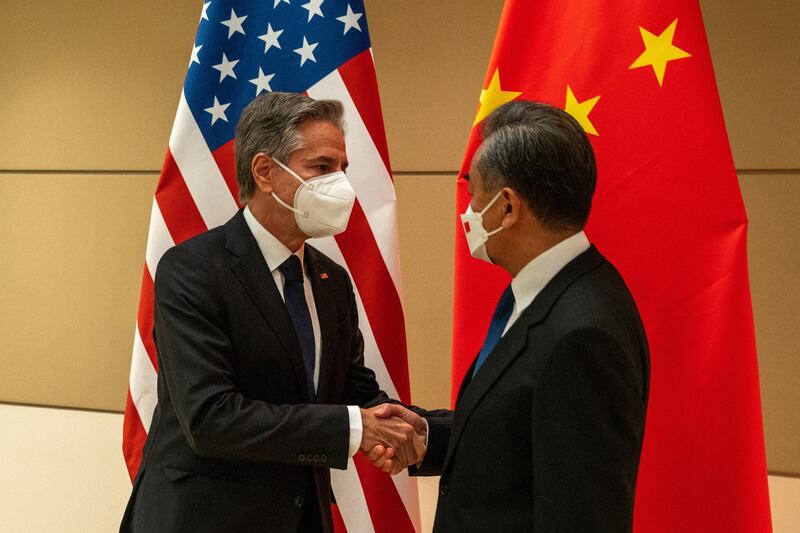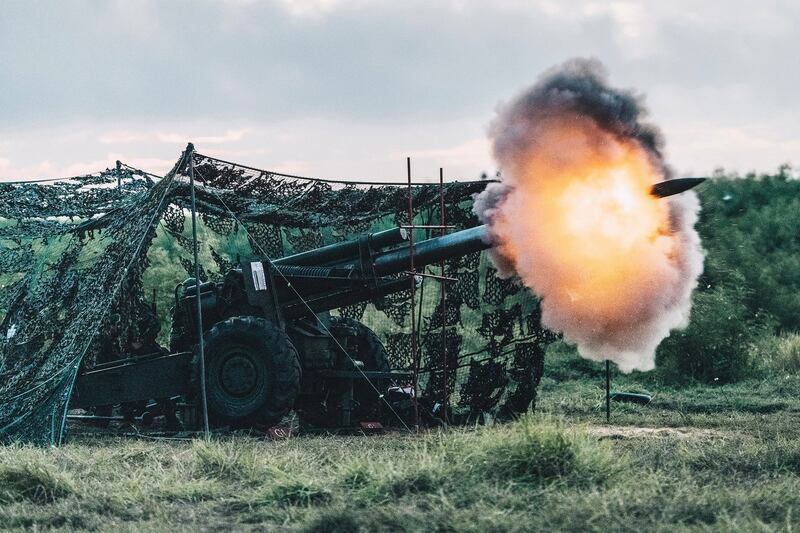While ties between Beijing and Washington appear to be on a more even keel following a ministerial-level phone call, the threat of a possible invasion of democratic Taiwan under the expansionist rhetoric of Xi Jinping still looms large over the relationship, analysts told RFA.
U.S. Secretary of State Antony Blinken spoke with his Chinese counterpart Wang Yi by phone for more than an hour, the State Department said on Sunday, prompting speculation of an improvement in the bilateral relationship in the wake of last month’s 20th party congress.
Ye Yaoyuan, head of international studies at the University of St. Thomas, said there have been no fundamental changes in China's foreign policy, however.
"It's going to be well-nigh impossible for there to be cooperation between the two countries if Xi continues to double down on his nationalistic approach in order to consolidate his internal prestige," Ye told RFA.
"The bilateral relationship will likely continue to worsen over the next couple of years because there is now less and less room for dialogue or opportunity for cooperation," he said.
Ye said Xi appears far more concerned with maintaining his grip on power than saving the economy or mending diplomatic fences.
Wang Weizheng, a professor of political science at Adelphi University, took a similar view.
"He personally believes that ... China cannot show weakness to other countries when it comes to foreign policy," Wang told RFA in a recent interview. "Foreign policy will be dominated by [the concerns of the ruling] party. You could even say it will be completely dominated by one individual."
Hard line on Taiwan
Pro-democracy analyst Li Weidong said this includes a total lack of concession on Beijing's claim on Taiwan, which has never been ruled by the Chinese Communist Party, nor formed part of the 73-year-old People's Republic of China – and whose 23 million people have no wish to submit to Chinese rule.
"When it comes to the Taiwan issue ... there will be further tensions between China and the United States," Li said. "The possibility that China will take a hard line again is still there. It hasn't gone away."
Taiwan's ruling Democratic Progressive Party held a symposium following Xi's re-election to discuss the implications for the island.
Deputy party chief Lin Fei-fan, a former leader of the 2014 Sunflower Movement, which occupied Taiwanese government buildings to stave off a controversial trade deal with China, said Beijing refused again at the recent party congress to rule out the use of military force to annex Taiwan.

The United States is obliged under the 1979 Taiwan Relations Act to ensure the island has the means to defend itself, but the full extent of its involvement in any future war remains uncertain.
"Xi Jinping said during his speech to the 20th party congress that he wouldn't renounce the use of force to 'unify' Taiwan, and repeatedly talked about one country, two systems as the goal of 'unification'," Lin told the symposium, in a reference to the formula under which Hong Kong was promised the continuation of its freedoms for 50 years, a promise the international community regards as having been largely broken by Beijing.
More dictatorial, less predictable
Chen Fang-yu, assistant professor of politics at Taiwan's Soochow University said that the more dictatorial a regime, the less predictable are its actions.
"Of course, what we need to do here in Taiwan is prepare ourselves," Chen said. "There is so much to do. Whether the invasion of Taiwan comes in 2023 or 2027, we really don't have much time."
"The whole world needs to stand together to show the Chinese dictatorship that the cost of a war, or using force, will be very high," he said. "Only then do we have a chance of stopping him."
Ma Chun-wei, an assistant professor of international affairs at Taiwan's Tamkang University, said Xi is at least a known political quantity.
"Since taking office in 2016, the Tsai administration has basically been very consistent in its cross-strait policy, so it's hard for me to imagine that there will be any major changes during the last two years of [Taiwan president] Tsai Ing-wen's final term in office," Ma told the symposium.
"However, if the next Democratic Progressive Party administration adopts a more radical China policy, this would definitely make a Chinese invasion of Taiwan more likely," he said.
“Manage this competition responsibly”
State Department spokesman Ned Price told a news conference on Monday that Washington is focusing on managing the U.S.-China relationship "responsibly."
"It is true, of course, that we have profound disagreements with [China] ... in a number of areas," Price said. " Ultimately, it’s a relationship that is predicated at its core by competition."
"Part of the reason why we believe it’s important to have regular dialogue and exchanges with [China] is because we believe we have to manage this competition responsibly," he said. "There are adversarial elements, as we know, and there are cooperative elements."
Chinese foreign ministry spokesman Zhao Lijian on Monday said Beijing would never renounce the use of force against Taiwan.
"We will never promise to renounce the use of force, and we reserve the option of taking all measures necessary," Zhao told a regular news briefing. "This is directed solely at interference by outside forces and ... separatist activities."
He accused "some people in the U.S." of using Taiwan to contain China.
"If the U.S. truly does not want to see a crisis in the Taiwan Strait, it needs to ... put an immediate end to irresponsible rhetoric and action," Zhao said.
Analysts said Xi has woven a nationalistic and expansionist rhetoric into his personal brand of political ideology, which underpins his personal power as party leader.
"What this nationalism promotes is a form of communist culture, which they think is enough to conquer the world," U.S.-based current affairs commentator Heng He told RFA in a recent interview. "This is the latest feature of [Chinese] nationalism."
The expansionist philosophy is clearly seen in the Xi buzzword, "community with a shared future for mankind," Heng said.

"This government ... wants to reset the world order, and it's necessary to incite nationalism, especially overseas, in order to achieve expansion," he said. "This kind of overseas nationalism ... is a tool for overseas expansion."
Xia Ming, politics professor at New York's City University agreed.
"The nationalism we see today is completely in the control of the state; it is in every respect a statist nationalism," Xia said, adding that it is also linked to Xi's refusal to step down.
"By forging a grand blueprint over a 30-year timeframe, [Xi] has given some kind of functional purpose to his own tenure," Xia said. "He has turned a dream of empire into a theoretical basis enabling him to be emperor."
Translated and edited by Luisetta Mudie.
